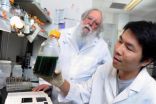(Press-News.org) SAN ANTONIO (May 26, 2011) — Community-acquired pneumonia is the leading cause of infectious death among the elderly. Newly published research from The University of Texas Health Science Center San Antonio suggests why older people are vulnerable and offers a possible defense.
The researchers found that when it comes to aging and pneumonia, one bad apple can ruin the barrel. Lung cells that were supposed to die due to DNA damage — but didn't — were 5 to 15 times more susceptible to invasion by pneumonia-causing bacteria. These bad apples also increased the susceptibility of normal cells around them. The research was published Wednesday [May 25] in the journal Aging Cell.
Close to 1 billion adults worldwide are at risk for pneumonia. They include more than 800 million adults who are older than 65 and an estimated 210 million with chronic obstructive pulmonary disease (COPD).
Injurious effects
Both age and COPD are associated with senescent cells, which are unable to die due to dysregulated function. These cells have increased levels of proteins that disease-causing bacteria stick to and co-opt to invade the bloodstream. The cells also spew out molecules that increase inflammation, and make normal cells nearby do the same.
"Senescent cells prime the lungs for infection," said Pooja Shivshankar, Ph.D., research scientist in microbiology and immunology at the UT Health Science Center and first author on the study.
Controlling the inflammatory molecules' release could short-circuit pneumonia risk in the elderly, said the senior author, Carlos Orihuela, Ph.D., assistant professor of microbiology and immunology, also at the Health Science Center.
"We can't stop aging, but our findings suggest that preventing inflammation might be the next best thing," Dr. Orihuela said. "This opens up possibilities for anti-inflammatory drugs as treatments for pneumonia."
Mouse study
The scientists compared aged and young mice, all healthy. The older mice were found to have increased lung inflammation with higher levels of senescence markers; this was consistent with previous studies in the literature.
The lung cells in aged mice also proved to be more susceptible to infection by Streptococcus pneumonia, the bacterium that causes pneumonia. This was determined by increased levels of proteins to which the bacteria adhere and by testing bacterial adhesion to the lung cells.
Four different experiments — on senescent cells, on normal lung cells exposed to senescent cells, on aged mice and on young mice exposed to gene-damaging stress — revealed increased susceptibility to pneumonia infection.
"This potentially helps to explain why the elderly and individuals with COPD are predisposed to community-acquired pneumonia," Dr. Orihuela said.
INFORMATION:
The scientists are in the Graduate School of Biomedical Sciences, the School of Medicine, and the Sam and Ann Barshop Institute for Longevity and Aging Studies at the UT Health Science Center San Antonio.
Cellular senescence increases expression of bacterial ligands in the lungs and is positively correlated with increased susceptibility to pneumococcal pneumonia. Pooja Shivshankar, Angela Boyd, Claude Le Saux, I-Tien Yeh, Carlos Orihuela. DOI: 10.1111/j.1474-9726.2011.00720.x
On the Web and Twitter
For current news from the UT Health Science Center San Antonio, please visit our news release website or follow us on Twitter @uthscsa.
About the UT Health Science Center San Antonio
The University of Texas Health Science Center at San Antonio, one of the country's leading health sciences universities, ranks in the top 3 percent of all institutions worldwide receiving federal funding. Research and other sponsored program activity totaled $228 million in fiscal year 2010. The university's schools of medicine, nursing, dentistry, health professions and graduate biomedical sciences have produced approximately 26,000 graduates. The $744 million operating budget supports eight campuses in San Antonio, Laredo, Harlingen and Edinburg. For more information on the many ways "We make lives better®," visit www.uthscsa.edu.
Aging, obsolete cells prime the lungs for pneumonia
2011-05-27
ELSE PRESS RELEASES FROM THIS DATE:
TGen study identifies compounds that could slow down Alzheimer's disease
2011-05-27
PHOENIX, Ariz. — May 26, 2011 — A family of naturally occurring plant compounds could help prevent or delay memory loss associated with Alzheimer's disease, according to a new study by the Translational Genomics Research Institute (TGen).
Beta-carboline alkaloids could potentially be used in therapeutic drugs to stop, or at least slow down, the progressively debilitating effects of Alzheimer's, according to the study published recently in the scientific journal Public Library of Science (PLoS) One.
One of these alkaloids, called harmine, inhibits a protein known as ...
Common transplant drug inhibits breast cancer growth, UNC laboratory study shows
2011-05-27
Tacrolimus, a drug that is commonly used to prevent organ transplantation rejection, inhibits breast cancer growth in pre-clinical studies. The finding from UNC scientists was reported in the May 26th PLoS ONE.
Nancy Klauber-DeMore, MD, associate professor of surgery, said, " We now have a rationale for performing human clinical trials to determine if Tacrolimus reduces breast cancer growth in humans. Since Tacrolimus is already an FDA-approved drug, the safety and toxicity profile is known, which means that Tacrolimus could potentially go directly into a later stage ...
Bruce Marks to Speak at US-Russia Business Council Forum in London
2011-05-27
Leading law firm, Marks & Sokolov, is pleased to announce Managing Director, Bruce S. Marks, will moderate a prestigious panel at the 3rd US Russia Business Council Legal Forum. A world leader in US, Russian and Ukrainian law and litigation, Bruce S. Marks brings a unique and important perspective to the forum.
Taking place in London on June 9th, 2011, the forum will gather the world's leading practitioners in US Russian commercial legal matters. Bruce S. Marks will moderate a panel entitled 'Legal Reform and the Courts in Russia'.
It's more than two years since ...
Current test-based incentive programs have not consistently raised
2011-05-27
WASHINGTON — Despite being used for several decades, test-based incentives have not consistently generated positive effects on student achievement, says a new report from the National Research Council. The report examines evidence on incentive programs, which impose sanctions or offer rewards for students, teachers, or schools on the basis of students' test performance. Federal and state governments have increasingly relied on incentives in recent decades as a way to raise accountability in public education and in the hope of driving improvements in achievement.
School-level ...
People with body-image disorders process 'big picture' visual information abnormally
2011-05-27
People suffering from body dysmorphic disorder, or BDD — a severe mental illness characterized by debilitating misperceptions that one appears disfigured and ugly — process visual information abnormally, even when looking at inanimate objects, according to a new UCLA study.
First author Dr. Jamie Feusner, a UCLA assistant professor of psychiatry, and colleagues found that patients with the disorder have less brain activity when processing holistic visual elements that provide the "big picture," regardless of whether that picture is a face or an object.
The research ...
5 new hot spots where medicine and technology will converge
2011-05-27
Medicine and technology are converging in patient care at a faster pace than most people realize. Space age advancements from point-of-care health technologies like telemedicine to medical robots performing surgery are fast becoming commonplace in many hospitals. What's next?
Ask NJIT Distinguished Professor Atam Dhawan, an electrical engineer and associate dean of the NJIT Albert Dorman Honors College, chair of the the IEEE emerging technology committee, and workshop chair for the upcoming 33rd IEEE Engineering in Medicine and Biology Society (EMBS) Annual International ...
Pan American Metals Pleased to Announce Gold and Silver Once Again the 'Safe Haven' Choice
2011-05-27
Market reports May 24 showed that gold and silver had regained their standing as 'safe haven' investments, with gold remaining comfortably above the $1500 an ounce benchmark, closing the day at $1523, the highest price for three weeks. Silver has also bounced back to close, May 24, at $36.12. Mounting concerns over European debt following rumors of a Greek default helped drive investors back toward the 'safety net' of precious metals. The UK, Italy, Spain and Portugal were causing concern as they faced reduced credit ratings and, in the case of Spain, a change of government. ...
Green and lean: Secreting bacteria eliminate cost barriers for renewable biofuel production
2011-05-27
TEMPE, Ariz.- A Biodesign Institute at Arizona State University research team has developed a process that removes a key obstacle to producing low-cost, renewable biofuels from bacteria. The team has reprogrammed photosynthetic microbes to secrete high-energy fats, making byproduct recovery and conversion to biofuels easier and potentially more commercially viable.
"The real costs involved in any biofuel production are harvesting the goodies and turning them into fuel," said Roy Curtiss, of the Institute's Center for Infectious Diseases and Vaccinology and professor ...
LateRooms.com - An Evening with the Legendary John Cleese Comes to Liverpool
2011-05-27
Liverpool welcomes An Evening with the Legendary John Cleese to the Empire Theatre at the end of the month.
Few comedians can claim to have had such a huge impact on the British canon of comedy as Cleese, who made his name in Monty Python's Flying Circus and Fawlty Towers.
With scenes like the 'Dead Parrot Sketch' and his hilarious silly walks, the 71-year-old has become a national treasure.
People heading to the show in Liverpool on May 31st can expect to enjoy his trademark sense of humour combined with insight into his long and successful career.
Speaking ...
Cancer cells accelerate aging and inflammation in the body to drive tumor growth
2011-05-27
PHILADELPHIA— Researchers at the Kimmel Cancer Center at Jefferson have shed new light on the longstanding conundrum about what makes a tumor grow—and how to make it stop. Interestingly, cancer cells accelerate the aging of nearby connective tissue cells to cause inflammation, which ultimately provides "fuel" for the tumor to grow and even metastasize.
This revealing symbiotic process, which is similar to how muscle and brain cells communicate with the body, could prove useful for developing new drugs to prevent and treat cancers. In this simple model, our bodies provide ...



